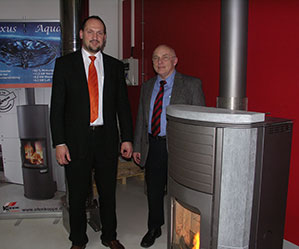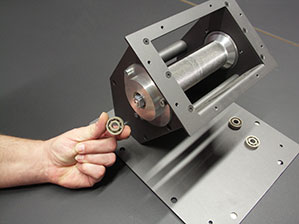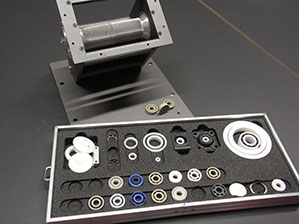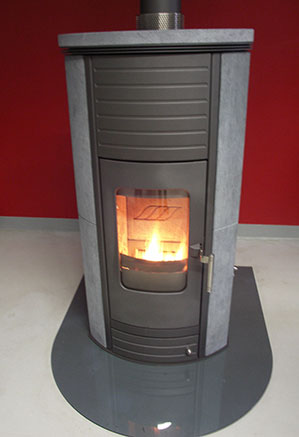Suitable for use without external energy
Lubricant-free igus® polymer ball bearings are used in pellet stoves
The ability to successfully combine plastic with high stove temperatures can be seen from Koppe pellet stoves for private households. These use a mechanical drive unit and burn the pellets without any need for electricity. Two igus® lubricant-free and thus maintenance-free polymer ball bearings in each stove ensure the smooth running and thus the long service life of the drive unit.
"I first came across lubricant-free polymer bearings several years ago at a solar technology trade fair," reports Franz Koppe, Managing Director of Erwim Koppe – Keramische Heizgeräte GmbH in Eschenbach, Upper Palatinate. "Despite not yet seeing any opportunity to use them in stove construction, I still took the time to find out all about them. " The entrepreneur had visited the igus GmbH booth when the specialist in polymer technology exhibited its energy chain and bearing-related products at the Photon trade fair in Munich, the world’s biggest exhibition for photovoltaic production technology.
About two years ago, the stove manufacturer decided to bring out a pellet stove. This is based on a mechanical drive unit that transports the wooden pellets into the combustion chamber without using any electricity. The aim was to develop a stove that used alternative energy sources without compromising on its performance. The pellets were to burn for up to 24 hours with a maximum heat output of 10 kW. "We spent a long time working on the drive system to ensure the running time. We sought a bearing for the drive mechanism that would function smoothly despite the adverse conditions," reflected the entrepreneur.
We became very interested in the igus® polymer bearing technology. All it took was a phone call and the technical sales consultant Bernhard Hofstetter came and presented possible solutions to us here at the company. It quickly became clear that xiros® polymer ball bearings were the only ones suitable for the job. Both polymer ball bearings in the mechanical drive unit offer good stability. Thanks to their maintenance-free dry operation and with the aid of high-performance polymers made from xirodur materials, many applications in which conventional metal ball bearings do not provide the desired results have now been made possible.
"Our aim was to design a heating appliance that could still be used in the event of a power cut without needed external energy," reports the Managing Director. The result is the Gravity, a pellet stove that combines the cosiness of a classic wood-burning stove with the convenience of pellet technology. It does not use any electricity, has three different heat settings and can be instantly switched off without waiting for the pellets to burn down entirely. It has an efficiency level of over 80 percent and is the first stove to operate using this system. Many patents have correspondingly been registered. The level of demand is high and the 70 or so employees can barely keep up with the production requirements at the site in Upper Palatinate.
One of the crucial points when developing the stove was how to feed in the pellets, which are controlled via the mechanical drive system. The requirements profile was clear. Firstly, consideration had to be given to the conditions that arise when using the stove. The interior temperature reaches at least 180°C and the pressed pellets create abrasive grit. Fine and ultra-fine dust is created during filling and transportation. Secondly, the stove needed to be easy to operate. The fuel had to be fed into the combustion chamber both reliably and quietly. And if the stove is left unused during the warmer months of the year, the drive unit must not resinify and become blocked but rather instantly work when the days turn cold again.
"We conducted a diverse array of tests over at least 18 months and in all weather conditions such as rain, snow, fog, wind and storms," states the technical director Alexander Rabenstein. "For instance, we placed a hot stove outside and let it freeze over completely without clearing out the pellets. Condensate formed inside the stove. The next day, we cleared out the swollen pellets, filled the stove and lit it. It instantly worked without any problems. “
The stoves are transported to their destinations by lorry. As they weigh around 290 kilograms, other equipment is also used, e.g. fork lifts. Again, the stove must not be overly sensitive and must be able to withstand vibrations without issue. "True to our company philosophy, we supply our customers with high-quality, reliable products with a long service life," Koppe explains. "The lubricant-free ball bearings play an important role in this environment. We were impressed with how they function right from the outset. “

Bernhard Hofstetter, technical sales consultant at igus® GmbH, and Franz Koppe, Managing Director at Koppe.

Two lubricant-free polymer ball bearings are used in the mechanical drive unit. These ensure that the pellets are fed into the combustion chamber via the rollers.

A whole array of xiros® polymer ball bearings is available for the broadest range of applications. Such products are replacing metal bearings with increasing frequency.

The pellet stove works without any electricity. It can run for up to 24 hours at a time and has an efficiency level of over 80 percent.
Unlike with a classic stove, the interior of a pellet stove contains moving parts. The stove is filled via two pellet containers. The pellets are transported from the storage container to the combustion chamber via a cylinder that sits on a shaft or a roller. The two maintenance-free xiros® ball bearings are installed in the roller on the left and right. These are made from xirodur A500, a high-temperature material that can temporarily withstand temperatures of up to 315°C. As the lack of lubricant prevents anything from sticking to the shaft interior, the polymer ball bearings durably guarantee the required smooth running properties. They are also non-fragile and withstand bumps, for example during transport or while being positioned.
"With relatively little space available, we had to find a small component that kept the entire mechanism running," comments Koppe. The stove manufacturer tested multiple heating appliances in parallel to find the option with the best results. Metal ball bearings not only seized up quickly but were also too loud while operating. Tests were also conducted with polymer plain bearings but their friction value was too high. "In terms of quiet running, service life, temperature resistance, dirt absorption and insensitivity, the igus® polymer ball bearings clearly provided great overall results," Bernhard Hofstetter states in conclusion. "The service life calculation, which we can provide if required, is a further plus point. This offers customers the necessary confidence in the product. “
More than 100,000 products available! Delivery and consultation Mon-Fri from 7am-8pm and Sat from 8am-12pm!